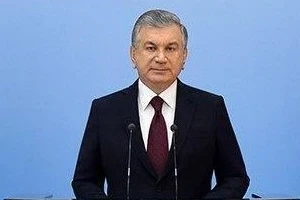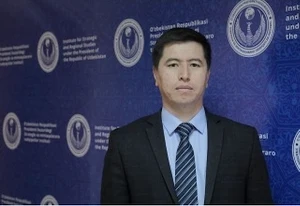Watching TRIPP: China and the art of strategic patience  By Yeghia TASHJIAN, Beirut-based regional analyst and researcher, columnist, "The Armenian Weekly” By Yeghia TASHJIAN, Beirut-based regional analyst and researcher, columnist, "The Armenian Weekly”
China’s position on the TRIPP (Trump’s Route for International Peace and Prosperity) has been cautious and low-profile, shaped less by enthusiasm for the project itself than by Beijing’s overall policy toward the South Caucasus and the region’s geopolitical rivalries. From China’s perspective, TRIPP is not mutually exclusive with the Belt and Road Initiative (BRI). From the U.S. perspective, however, the project carries geopolitical weight, aimed at containing or counterbalancing Russian, Iranian and Chinese influence in Eurasia.
China has evaluated TRIPP primarily through the lens of risk management, given that the route traverses border regions historically vulnerable to conflict and border tensions and lies at the intersection of regional rivalries. This helps explain why Beijing has avoided any public endorsement, opting instead for rhetorical neutrality and a wait-and-see approach — signalling that economic connectivity must be inclusive, territorial integrity respected, trade depoliticized and cooperation insulated from zero-sum geopolitical competition.
READ MORE
- Wednesday, 18 February 2026, 05:04
TRIPP and the Rise of a Trans-Regional Energy Corridor in the South Caucasus
 By Vasif HUSEYNOV, PhD, Head of Department, AIR Center, Adjunct Lecturer, ADA and Khazar Universities, Baku By Vasif HUSEYNOV, PhD, Head of Department, AIR Center, Adjunct Lecturer, ADA and Khazar Universities, Baku
The South Caucasus is entering a new phase of regional energy reconfiguration as Azerbaijan moves forward with plans to transmit electricity to its Nakhichevan exclave through southern Armenia, along the Zangezur corridor. What was once understood mainly as a transport initiative is now, under the Trump Route for International Peace and Prosperity (TRIPP), evolving into an energy corridor with significant regional and geopolitical consequences. The launch of construction on the Zangezur high-voltage transmission line and parallel political signals from Baku, Yerevan, and Ankara suggest that trans-regional energy connectivity may become the most immediate and transformative dimension of post-conflict normalization. On January 29, it was reported that Azerbaijan had begun construction of the Zangezur high-voltage power transmission line, a technically complex project designed to integrate the Nakhichevan Autonomous Republic into the country’s unified electricity system and to form a critical segment of an emerging Azerbaijan–Türkiye–Europe electricity corridor. READ MORE
- Wednesday, 18 February 2026, 05:00
How the 2025 NSS Reshapes U.S. Engagement in the South Caucasus
 By Aytaс MAHAMMADOVA, Energy Security Expert affiliated with the Caspian-Alpine Society
By Aytaс MAHAMMADOVA, Energy Security Expert affiliated with the Caspian-Alpine Society
The South Caucasus has long occupied an ambiguous place in American foreign policy, neither central to U.S. national security nor irrelevant to it. The region has historically mattered insofar as it intersected with larger geopolitical contests: between Russia and the West, between energy producers and consumers, and between stability and fragmentation along Eurasia's inner frontier. The 2025 U.S. National Security Strategy codifies a shift that will sharpen this logic, moving the United States decisively away from expansive regional engagement toward selective, interest-driven involvement. While the document does not explicitly address the South Caucasus in its regional sections, its underlying principles, such as restraint, burden-sharing, transactional-ism, and rejection of transformational agendas, will fundamentally reshape Washington's engagement with the South Caucasus states. This recalibration reflects broader strategic realities: finite American resources, diminished appetite for open-ended commitments, and recognition that regional outcomes will ultimately be determined by local power dynamics rather than external patronage. READ MORE
- Tuesday, 13 January 2026, 06:58
Exporting Power: Türkiye’s Defence Industry and the Politics of Strategic Autonomy
 By Fuad SHAHBAZOV, Baku-based independent regional security and defence analyst By Fuad SHAHBAZOV, Baku-based independent regional security and defence analyst
Over the last decade, the development of Turkey’s defence industry has become a crucial aspect of its soft power diplomacy in both regional and global politics. The country has made significant efforts to invest heavily in the development of its indigenous defence industry, reducing its dependence on imports and becoming a leading defence exporter in global markets. The rapidly changing regional and global geopolitical landscape, particularly after the Arab uprisings, has prompted Ankara to expand the country’s defence industry and reduce its reliance on overseas arms procurement and international supply chains. Since the ruling AKP government came to power, the country’s indigenous defence industry has undergone a significant transformation, steadily becoming the twelfth-largest arms exporter, according to the Stockholm International Peace Research Institute (SIPRI). Given the regional instability marked by violent uprisings and sectarian conflicts, Türkiye’s pursuit of defence industry development can be understood as a primarily threat-driven strategy. This approach reflects an effort to enhance national defence capabilities and ensure strategic autonomy in response to both external security challenges and internal vulnerabilities. READ MORE
- Monday, 22 December 2025, 08:29
Israel War Erodes Iran’s Relations with Azerbaijan
 By Fuad Shahbazov, Baku-based independent regional security and defence analyst By Fuad Shahbazov, Baku-based independent regional security and defence analyst
The 12-day Israel-Iran war revealed new vulnerabilities in the Islamic Republic and increased tensions between Iran and its neighbour, Azerbaijan. In the aftermath of the strategic setback to Iranian nuclear and military facilities, Iran’s conservative political and security establishment began shifting focus toward perceived “close enemies” said to be complicit in the Israeli attacks. Among the primary targets of this narrative has been Iran’s northern neighbor, Azerbaijan, which Iranian state-run media and channels affiliated with the Islamic Revolutionary Guard Corps (IRGC) accused of providing “intelligence support to Israel” during the strikes on nuclear, military, and civilian sites. While Azerbaijani officials categorically denied any involvement in Israeli military operations and the Iranian government did not present concrete evidence supporting its claims, the media campaign renewed tensions between Tehran and Baku, undermining a period of cautious diplomatic stability that had followed earlier disputes over Armenia and other issues. Indeed, the Iranian criticism of a growing Azerbaijan-Israel alliance is not a new phenomenon and Azerbaijan’s ties with Israel have long been a source of discontent in Azerbaijan-Iran relations. READ MORE
- Thursday, 31 July 2025, 12:19
Armenia and Azerbaijan have taken a new route in their quest for peace

 By Benyamin POGHOSYAN, PhD, Senior Research Fellow at the APRI Armenia
By Benyamin POGHOSYAN, PhD, Senior Research Fellow at the APRI Armenia
Lara SETRAKIAN, President, APRI Armenia
Political scientists and wider civil society from Armenia and Azerbaijan don’t often see eye to eye. After decades of war between the two countries their grievances run deep, with each side blaming the other for continued rounds of conflict. But experts in Yerevan and Baku can now agree on one thing: the meeting held in Abu Dhabi on July 10 between their heads of government was a moment of respite for the South Caucasus. After months without a major meeting between the two sides (the leaders met briefly at the margins of the European Political Community summit in Tirana in May), Abu Dhabi was able to host their most comprehensive gathering in known history, attended by representatives who cover all key aspects of the Armenia-Azerbaijan peace process. Still, expectations should be managed. The two sides may yet be very far from signing a peace agreement, though a draft was announced earlier this year. There are thorny issues, like border demarcation, that remain unresolved. And there are competing visions for how the future of transport links should evolve. Nonetheless, the Abu Dhabi meeting has revived the diplomatic track, giving new hope for peace and stability, while calming fears of an imminent outbreak of war.
READ MORE
- Thursday, 31 July 2025, 07:56
The Multidimensional Foreign Policy of New Uzbekistan  Bakhram Sotiboldiev,
Bakhram Sotiboldiev,
Head of the Department of the Institute for Strategic and Regional Studies under the President of the Republic of Uzbekistan
In today's rapidly changing world, Uzbekistan confidently positions itself as one of the key players on the international stage. The country’s foreign policy, reinvigorated with the election of Shavkat Mirziyoyev as President in 2016, demonstrates impressive results, transforming the republic into a significant center for regional and global diplomacy. READ MORE
- Monday, 16 December 2024, 08:56
In Uzbekistan, strengthening interethnic and interfaith solidarity is always a priority of state policy  Samariddin Sattorov,
Samariddin Sattorov,
Chief Researcher of the Institute for Strategic and Regional Studies under the President of the Republic of Uzbekistan
In recent years, geopolitical tensions have been increasing in different regions of the world, and interethnic conflicts and contradictions on religious grounds continue to worsen.
In the context of such instability, maintaining an open and constructive dialogue between different religious and cultural groups is becoming vital. Strengthening religious tolerance helps to create an atmosphere of mutual understanding, respect and generosity in society, which in turn alleviates tensions and prevents the escalation of conflicts. READ MORE
- Friday, 6 December 2024, 19:19
|
|